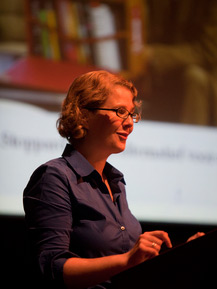Dutch scholar Esther Peeren to present on the 'ghost/spectre' as archival metaphor


Peeren is Associate Professor of Media Studies at the University of Amsterdam, Vice-Director of the Amsterdam Centre for Globalisation Studies (ACGS) and senior researcher at the Amsterdam School for Cultural Analysis (ASCA). Her current research projects explore global spectralities and rural globalization.
She will deliver a lunchtime lecture, Lumumba's Ghosts: Immaterial Matters and Matters Immaterial in Sven Augustijnen's Spectres, on Tuesday, 26 August. In her analysis of Belgian artist Sven Augustijnen's 2011 multi-media exhibition, Spectres (which focuses on the mystery of the 1961 assassination of Patrice Lumumba, the first democratically elected Prime Minister of the independent Republic of the Congo), Peeren argues that a focus on immaterialities-as-spectralities prompts the viewer to take seriously that which is not immediately apprehensible, or deemed inconsequential. At the same time, it transforms our understanding of matter itself, since immateriality is inevitably implied in materiality, both metaphorically (materialities may be considered immaterial, insignificant) and literally (over time, materialities may transform, decay or even disappear).
Appealing to Jacques Derrida's concept of spectrality, her analysis shows how Augustijnen's work, especially the feature-length film included in the exhibition, moves the materiality of the immaterial and the immateriality of the material centre stage and lays out the consequences of this double imbrication for individual and collective understandings of history, memory and the archive.
Augustijnen's 2011 film, Spectres, shadows the Belgian ex-colonial officer, Jacques Brassinne de la Buissière, over the course of his obsessive investigation into the assassination of Patrice Lumumba, on 17 January 1961. Ostensibly, what is at stake is the adjudication of whether and to what extent Belgian authorities were involved in Lumumba's elimination.
Augustijnen follows Brassinne - who, in 1991, defended a dissertation arguing against Belgian complicity - as he undertakes a series of interviews and a journey to the Democratic Republic of Congo to re-substantiate his account. This has become necessary in the wake of sociologist Ludo de Witte's 1999 book The Assassination of Lumumba, which holds Belgian officials, as well as the CIA, directly responsible, and the 2001 findings of a parliamentary investigation commission, which prompted the Belgian Minister of Foreign Affairs to extend an official apology.
Brassinne is convinced that the unrelenting gathering of documents, eye-witness accounts and photographs, together with pinpointing the precise physical location of the events will eventually equate to incontrovertible evidence of 'the truth'. But in its framing of his quest, Spectres, which, in its title, invokes Jacques Derrida's Spectres de Marx (1993), portrays Lumumba's assassination as a haunting structure that derives its continuing discomforting power precisely from its refusal of full materiality and definitive explanation.
This event will be followed by a one-day workshop with presentations by APC colleagues, invited guests, and Peeren's introduction to The Spectral Metaphor: Living Ghosts and the Agency of Invisibility on 27 August. Our focus will be to engage in a conversation around the recent 'revival' of the ghost/spectre in the Humanities, especially in Euro-American academic debates. Engaging these debates from our position in the South, we are interested in probing the concept of the spectral metaphor so as to discuss its usefulness, together with its similarities and divergences with both ghosts and ancestors, for instance in haunted archives and ancestral practices of curating the past.
We welcome scholars from different disciplines and fields who wish to present work concerning ancestors, ghosts, spectres, and spectrality.
In addition to The Spectral Metaphor: Living Ghosts and the Agency of Invisibility (Palgrave, 2014), Peeren is the author of Intersubjectivities and Popular Culture: Bakhtin and Beyond (Stanford UP, 2008), and co-editor of The Shock of the Other: Situating Alterities (Rodopi, 2007), Representation Matters: (Re)Articulating Collective Identities in a Postcolonial World (Rodopi, 2010), Popular Ghosts: The Haunted Spaces of Everyday Culture (Continuum, 2010) and The Spectralities Reader (Bloomsbury, 2013).
For further information please contact Dr Anette Hoffmann (anetteh3@gmail.com).